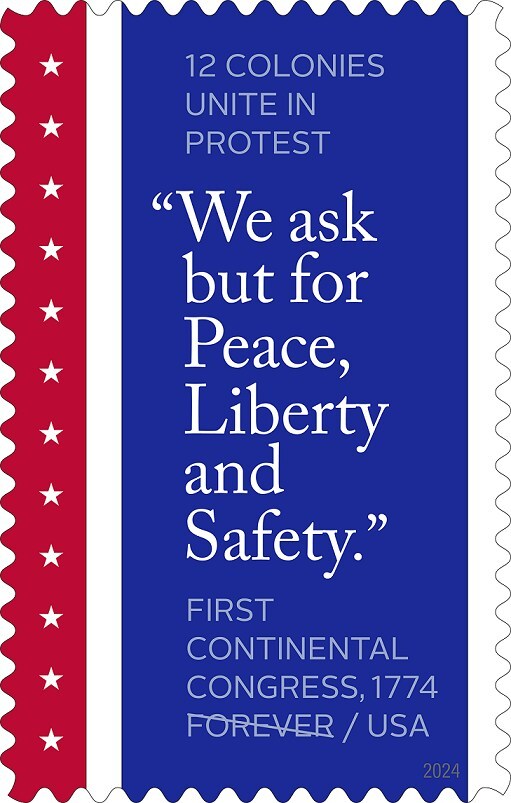U.S. Postal Service commemorates 250th anniversary of the First Continental Congress with a new Forever stamp
PHILADELPHIA, Sept. 5, 2024 -- On this day 250 years ago, the foundation of American independence was laid when the First Continental Congress met at Carpenters' Hall to determine how to safeguard the Colonies' rights against British rule. The U.S. Postal Service today honors the anniversary of that first gathering and the delegates who bravely planted the seeds of democracy with a new Forever stamp, First Continental Congress, 1774, debuting at the place where it all began.
"So much of our nation's history is tied to this great city, and today, we mark another important chapter with the 250th anniversary of the First Continental Congress," said Roman Martinez IV, USPS Board of Governors chairman and dedicating official for the stamp. "Here, where the footholds of freedom were established, we dedicate this stamp with a spirit of gratitude for the freedoms that we still enjoy today."
Joining Martinez for the ceremony were Michael Norris, executive director of Carpenters' Hall, who served as emcee; Alyssa Constad, assistant director, Carpenters' Hall; Michael Elston, secretary general, National Society of the Sons of the American Revolution; Steven Simms, superintendent of Independence National Historical Park, National Park Service; and J Ward Larkin, a historical interpreter portraying Benjamin Franklin.
"As we celebrate the 250th anniversary of the Hall and the First Continental Congress, and the 300th anniversary of the Carpenters' Company of Philadelphia, it is a great honor to do so with another historic and honored institution, the United States Postal Service," said Constad. "We are thrilled that we can commemorate such a salient moment in our history with this stamp release, and it's a privilege to do so."
When the British Parliament passed the Tea Act on May 10, 1773, it formalized a monopoly on tea sales in the Colonies, compelling Colonists to pay the widely disputed Townshend Revenue Tax and symbolically established acceptance of Parliament's right to tax them. This led to the Boston Tea Party on Dec. 16, 1773, when Colonists protested by boarding three East India Company ships and dumping the tea overboard, provoking the Crown.
In response to that defiance, British Parliament passed the Coercive Acts, aiming to bring the rebellious, but still generally loyal, subjects to heel, and by extension, subdue the Colonies. The new laws included the Boston Port Act, which closed Boston Harbor to all export and most import traffic. Boston sent out a plea for help, calling for an intercolonial meeting to address the growing crisis.
On Sept. 5, 1774, the First Continental Congress convened at Carpenters' Hall in Philadelphia with 56 delegates from 12 colonies. Among those gathered were future presidents George Washington and John Adams. The meeting would serve two purposes; to protect commerce and trade, and to safeguard Colonial rights.
On Oct. 14, 1774, the delegates approved the Declaration and Resolves of the First Continental Congress, laying out specific objections to the Coercive Acts and proclaiming that all Colonists in America were "entitled to life, liberty and property." The fledgling lawmakers also issued the Articles of Association, which bound every colony, except Georgia, which had abstained, to a boycott of trade with Britain if the Acts were not rescinded.
Before the First Continental Congress ended on Oct. 26, 1774, the delegates drafted a petition to King George III, laying out specific grievances and pleading with him to intervene with Parliament on behalf of the Colonies. "We ask but for peace, liberty and safety," it read. The petition was presented by Benjamin Franklin and rejected by the king, who mistakenly believed that the American Colonies would never unite in opposition to British rule.
By the time the Second Continental Congress met on May 10, 1775, the Colonists had won their first victory in the Revolutionary War, defending Lexington and Concord from the British. The Continental Congress served as the provisional central government until 1781, authoring the Declaration of Independence in 1776, the 1777 Articles of Confederation, and ultimately overseeing the issuance of currency, the creation of a postal system and the naming of the new nation as the United States of America.
The stamp art reflects the U.S. flag, featuring a thin red stripe decorated with 12 white stars on the left side, representing the number of Colonies involved in the Congress. A prominent vertical blue band, bordered by narrow white stripes, occupies the rest of the stamp, with an excerpt from the petition sent to King George III on Oct. 25, 1774. Antonio Alcalá served as art director, designer and typographer.
News of the stamp is being shared with the hashtag #FirstContinentalCongressStamp.
Postal Products
Customers may purchase stamps and other philatelic products through the Postal Store at usps.com/shopstamps, by calling 844-737-7826, by mail through USA Philatelic or at Post Office locations nationwide. For officially licensed stamp products, shop the USPS Officially Licensed Collection on Amazon. Additional information on stamps, first-day-of-issue ceremonies and stamp-inspired products can be found at StampsForever.com.
Please Note: The United States Postal Service is an independent federal establishment, mandated to be self-financing and to serve every American community through the affordable, reliable and secure delivery of mail and packages to 167 million addresses six and often seven days a week. Overseen by a bipartisan Board of Governors, the Postal Service is implementing a 10-year transformation plan, Delivering for America, to modernize the postal network, restore long-term financial sustainability, dramatically improve service across all mail and shipping categories, and maintain the organization as one of America's most valued and trusted brands.
The Postal Service generally receives no tax dollars for operating expenses and relies on the sale of postage, products and services to fund its operations.
For USPS media resources, including broadcast-quality video and audio and photo stills, visit the USPS Newsroom. Follow us on X, formerly known as Twitter; Instagram; Pinterest; Threads and LinkedIn. Subscribe to the USPS YouTube Channel and like us on Facebook. For more information about the Postal Service, visit usps.com and facts.usps.com.
National contact: Martha Johnson
martha.s.johnson@usps.gov
Local contact: Paul Smith
paul.f.smith@usps.gov
usps.com/news
This News is brought to you by Qube Mark, your trusted source for the latest updates and insights in marketing technology. Stay tuned for more groundbreaking innovations in the world of technology.









